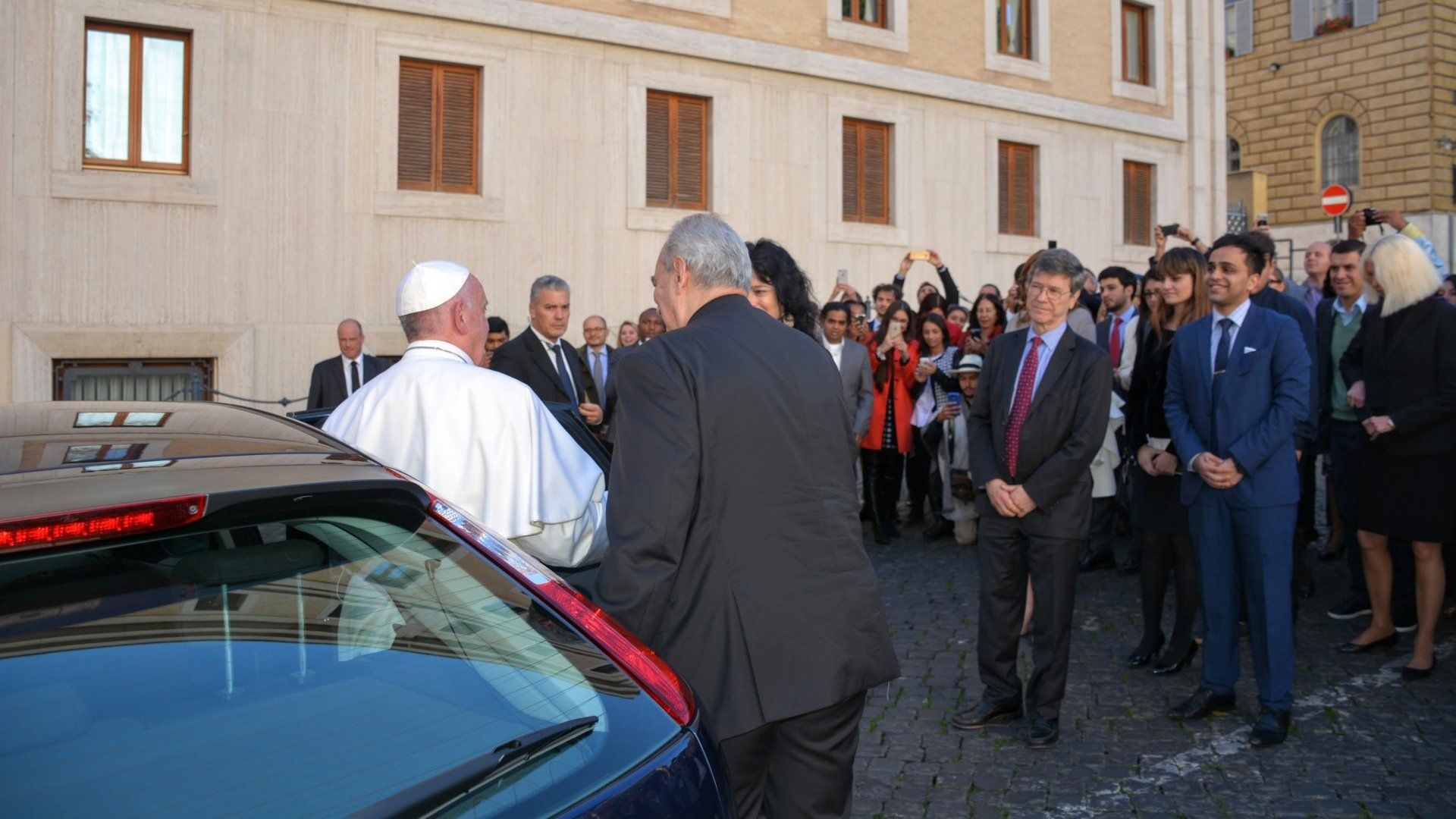Participates in Vatican Youth Symposium
Blue Chip Foundation
October 31, 2016
Casina Pio IV , Vatican City— Blue Chip Foundation founder Jennifer Gross participated in the SDSN Youth and Pontifical Academy of Sciences’ “Vatican Youth Symposium: Youth and the SDGs – Challenges and Opportunities” in October to help ensure that the world’s young people—who have a personal stake in the 2030 Agenda for Sustainable Development —are aware of their right to spearhead the sustainable development movement.
“These youth are inheriting the planet. Their creativity, energy and passion is what’s going to fuel generational change,” says Gross. “Young people can achieve so much, so quickly; they can help build a new system that encourages international cooperation and focuses on ending extreme poverty, the impact we make on earth, and decreasing inequality.”
The two-day symposium featured young people from all over the world who are already engaged in promoting and implementing the UN’s Sustainable Development Goals , or SDGs . Delegates from over 30 countries (63 percent of whom came from the Global South) to represent a variety of perspectives. Fifty-three percent of delegates were female, and the remaining 47 percent were male.
Young people have the capacity to solve complex problems and spearhead the movement for change; they possess a unique quality described by experts as fluid intelligence. Research suggests that young people are more likely to accept change, believe in climate change, advocate for social causes and volunteer. These individuals aren’t as exposed to the thinking that defined social mores or political and economic norms of the previous generation, which makes them more capable of adapting.
About half of all delegates participating in the symposium viewed funding and the lack of financial resources as the biggest barrier to implementing the SDGs, while others cited differing social paradigms, lack of progressive cultures, and lack of access to various resources as the largest challenges.
The Pontifical Academy of Sciences is the only supranational academy of sciences in the world, and its mission is to honor pure science, ensure its freedom and encourage research. SDSN Youth’s primary mission is to educate young people about the challenges sustainable development poses, and it creates opportunities for them to pioneer innovative solutions for the SDGs.
The SDGs comprise 17 goals and 169 targets, which 193 governments passed in September 2015. Together, they constitute a plan of action for people, planet and prosperity.
Under the Millennium Development Goals , or MDGs, the fight against poverty has made tremendous progress—but there are still more than a billion people in extreme poverty.
“Three decades from now the world is going to be a very different place. How it looks will depend on actions we take today. We have big decisions to make and little time to make them if we are to provide stability and greater prosperity to the world's growing population,” said UN Secretary General Ban Ki-moon in 2014, two years after he launched the Sustainable Development Solutions Network, or SDSN.
The SDSN’s primary mission is to mobilize global scientific and technological expertise as a means of promoting practical problem-solving for sustainable development. In 2015, the SDSN launched its youth program—SDSN Youth—to mobilize the resources necessary to engage and empower young people specifically.
Malav Sanghavi, the young Indian man whose innovation placed first in the competition, created the LifeCradle, a social enterprise aimed to reduce the world’s infant mortality rate in underdeveloped and developing countries. LifeCradle benefits those in areas bereft of quality neonatal care due to costly equipment and inconsistency of electricity. It’s a low-cost, cardboard baby incubator that provides warmth, a clean environment and easy monitoring for an infant’s first few days—the most critical in his or her life—that can also serve as a makeshift bassinet once he or she is home. The lid of the LifeCradle, which contains all the technology the apparatus needs, is then used for another child. This remarkable innovation addresses SDG 3, “Ensure healthy lives and promote well-being for all, at all ages,” and SDG 9, “Build resilient infrastructure, promote inclusive and sustainable industrialization, and foster innovation.”
Canadian Jordan Imahori created the Evaporative Cooling Vest to reduce heat-related deaths and medical complications in the construction industries of countries where severe heat stress is a known workplace hazard. The cooling vests use evaporated water to bring down high temperatures and reduce the impact of heat on health, and they incorporate the traditional features of high-visibility construction vests. They also meet ISO, ANSI, OEKO and REACH standards, so workers can wear them as replacements for conventional safety equipment. Evaporative Cooling Vests are under development by Aegis, a nonprofit organization, and they’re being piloted in Qatar, where research is proving that they are effective. This solution, which is currently focused on reaching the Gulf Cooperation Council member states, meets SDG 8 (specifically, target number 8.8), “Protect labor rights and promote safe and secure working environments for all workers, especially migrant workers, particularly women workers, and those in precarious employment.”
The two winning solutions were announced by Siamak Sam Loni, global coordinator of SDSN Youth, during the closing ceremony of the Vatican Youth Symposium.
The innovations and solutions displayed at the Vatican Youth Symposium are a clear signal that achieving the Sustainable Development Goals is within reach, provided we invest in the creativity and commitment of young people and leverage technological solutions that help implement the 2030 Agenda for Sustainable Development. Cooperation between young leaders from a wide range of cultures and disciplines is one of the fundamental keys to achieving the SDGS, and the symposium was a crucial opportunity to show youth what a tremendous impact they can make.
Blue Chip Foundation, a founding member of Ethics in Action , works to alleviate extreme poverty in all of its forms through achievement of the Sustainable Development Goals.




